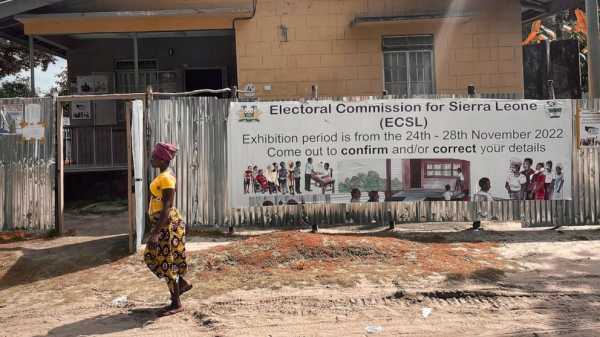
FREETOWN, Sierra Leone — With mounting frustration due to an ailing economy, rising unemployment and looming deadly protests, Sierra Leoneans are heading to the polls on Saturday, June 24, to select their next president.
Thirteen people are vying for the top job in the west African country. But experts say it's likely to be a two-horse race between incumbent President Julius Maada Bio — elected in 2018 and fighting for his second term — and Samura Kamara, the head of the All People's Congress Party, Sierra Leon's main opposition camp.
The winner needs 55% of the vote to clinch victory in the first round or it goes into a runoff within two weeks.
More than three million people are registered to vote in the coming week. This would mark the country's fifth presidential election since the end of a brutal 11-year civil war — more than two decades ago — which left tens of thousands dead and destroyed the country's economy.
Sierra Leone had witnessed two peaceful transfers of power since, from the ruling party to the opposition party.
Bio has been facing increasing criticism because of debilitating economic conditions. Nearly 60% of Sierra Leone’s population of more than seven million are facing poverty, with youth unemployment being one of the highest in West Africa.
Multiple deadly anti-government protests rocked the country, with calls for Bio to step down. Fueled by a rise in cost of living, the latest one in August, left dozens dead, including security forces.
As of April, Sierra Leone, which has one of the world's weakest currencies, saw inflation rise to more than 43% — from a high of more than 41% in March — and the exchange rate against the U.S. Dollar is under pressure, according to economic analysts.
The election also comes during a surge of regional political upheaval, with deadly clashes between supporters of the opposition leader, Ousmane Sonko, and police in Senegal as well as military coups in Burkina Faso and Mali.
Thus, Sierra Leone having a peaceful vote is of greater importance, say analysts.
“We’ve seen this democratic backsliding in the region. So if Sierra Leone's (presidential) election is free, fair and credible, it could be a bellwether for regional democracy,” said Jamie Hitchen, a political analyst focused on Sierra Leone and an honorary research fellow at the University of Birmingham.
This week's vote is expected to be a tight race. It will be a reverse of the 2018 presidential elections when Bio — at the time representing the opposition party — faced Kamara from the then-ruling party, whom the former president had handpicked as his successor.
Bio, at the time, narrowly beat Kamara in a runoff by a margin of less than 5%, mainly because of support in the southern and eastern districts. Kamara garnered support from the north and west regions.
A former military head of state, Bio came to power promising to end rampant corruption. Analysts say that he had invested in improving education in the country and took steps to fight rampant corruption. The country ranked 110 on Transparency International's index in 2022, moving up from 129 when he took office. But the weak economy has drawn criticism, with Sierra Leoneans taking to the streets protesting widespread poverty.
Bio coined his current presidential campaign, “The People's Manifesto 2023,” promising to “solidify gains” made during his tenure.
“Despite the turbulent times globally, we have done the work in the past five years,” he said at his campaign launch in May, assuring his supporters of a “victory in the polls, with God on our side.”
Bio's opponent, Kamara, a seasoned politician who served in various government positions including as foreign minister, is running while facing corruption charges, since 2021, of allegedly embezzling public funds from a renovation project in New York during his time as minister. His case is set to be heard in court by mid-July. He's hoping to catapult support by promising to fix the country’s economic woes.
Regardless of who wins the election, economic growth is expected to remain slow, bogged down by sluggish global expansion and a rise in domestic inflation, said Rukmini Sanyal, an analyst for the Economist Intelligence Unit, a research and analysis division of the Economist Group.
The new government will face the same macroeconomic challenges and so “the risk of social unrest” will continue over the near-term, Sanyal said. Public frustration over soaring inflation, widespread poverty and high unemployment rate "will play a key role in eroding away the incumbent (party's) popularity,” she said.
Still, locals say prices have spiked so much, that another term of the current president isn't comforting.
“We need someone who can manage the economy because clearly (the president) is unable to, and we are suffering,” said Alpha Kamara, a taxi driver in the capital, Freetown.
Some people, however, say the ruling party has a proven track record and they are willing to give it more time. “I want to see more development, which is why I am going to vote for Bio," said Mohamed Lamin, a local, “he provided us with free education, built roads, a new airport and many other (projects).”
Rights groups warn that economic troubles are compounding distrust in a population already skeptical of government institutions and that neither party has so far presented “a meaningful path forward.”
“One of the biggest fears of (the population) is the fear of crisis. We live in a society where we have a huge level of distrust among ourselves,” said Abdul Fatoma, chief executive for Campaign For Human Rights Development International, a local advocacy group.
“The opposition and the ruling party are not giving us a clear roadmap as to how we are going to revamp the economy," he said, "How are we going to build trust in investors (and) businesspeople?”
But for many Sierra Leonians, once the votes are cast on June 24, what they'll be watching for is a president who can bring people together.
“Within their first 100 days, (the winner) should try not to vilify their opponents, nor create a hostile environment where people start feeling left out,” said Thomas Moore Conteh, the executive director for the Citizens Advocacy Network, a local rights group.
“What we expect is (a president who) unifies the country, and works on building a powerful economy."
———-
Mednick reported from Dakar, Senegal
Sourse: abcnews.go.com






